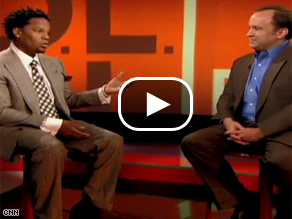 A new InsiderAdvantage/Poll Position survey shows the remarkable: Barack Obama could very well win the deep-red state of Georgia.
A new InsiderAdvantage/Poll Position survey shows the remarkable: Barack Obama could very well win the deep-red state of Georgia.
The Illinois Democrat, according to the poll, has a slight edge over John McCain -- by a margin of 48 percent to 47 percent. The findings represent an outlier from other public opinion surveys, though Democracy Corps had the race extremely tight just a few days ago. The attention they are garnering is driven as much by the novelty as by a sincere belief that Obama could pull off the upset.
But from a strictly numerical standpoint, political observers shouldn't be all that shocked if the Democrats flips the Peach State. The data certainly lines up in Obama's favor.
The population in Georgia, according to the 2005 U.S. Census estimate, breaks down roughly as follows: 61.5 percent white, 30 percent African-American, and 6.5 percent Hispanic.
But the political map has, traditionally, been different. In 2004, the Georgia voting public consisted of roughly 3,280,000 individuals who broke down as follows: 70 percent white, 25 percent African-American, and 4 percent Hispanic.
Those dynamics led to a fairly easy victory for George W. Bush. The president took 76 percent of the white vote, 12 percent of the black vote, and 56 percent of the Hispanic vote en route to winning the state by a margin of 58 percent to 41 percent.
Flash forward four years and every change in Georgia's demographics appears to be favoring Obama. The Hispanic vote, which is growing in the state, is trending his way. The white vote is still predominantly Republican, but McCain's trouble with the base suggests he won't match the success that Bush enjoyed. And African-Americans are expected to go to the polls in record numbers.
So what does this mean in practical political terms? A Democratic friend does the math:
The big question is not if African-Americans' share of the electorate will increase, but by how much and what that will do to the share of the electorate made up by whites. The potential electorate could look as follows.Whites: 64 percent African Americans: 31 percent Hispanics: 5 percent
Let's say McCain gets 71% of the white vote, Obama 26%, and [Third Party candidate] Bob Barr 3%, which is reasonable and perhaps a bit cautious on Obama's and Barr's shares. Then there is the Hispanic vote, which favored Bush in 2004 but nearly everyone has now given Obama roughly 2-1. Meanwhile, let's put Obama's support among African-Americans at 95%, which I think is reasonable.
The end result -- if one assumes the same number of voters that showed up four years ago (3,280,000) come to the polls next week -- would be as follows:
Obama would end up with 49.39 percent of the vote (approximately 1,610,000 votes) McCain would end up with 48.64 percent of the vote (approximately 1,590,050 votes)This is, to be sure, the most optimistic scenario that Democrats can imagine. Matt Bocian of Democracy Corps says that in all likelihood, the African-American vote will hover somewhere between 26 and 27 percent, even with record turnout. One must consider that a portion of that group isn't of age to vote. And without an accompanying drop in McCain's support among whites, Obama could fall short of the upset.
Still, Georgia should be a state to watch on November 4th. Throughout the Democratic primary, pollsters consistently underestimated Obama's tallies in southern states, despite pegging Hillary Clinton's numbers accurately. In Georgia, for example, Obama's support jumped from 50 percent in early February to 66 percent when the vote took place, while Hillary Clinton stayed roughly at 30 percent.
In addition, the Obama campaign has done absolute yeomen's work in reaching out to and registering African-American voters. More than 400,000 newly registered voters were reported between January 1st and September 30th, according to the Atlanta Journal Constitution; 164,859 of those voters are African-American, 176,570 are white.
If African-Americans can defy pollster expectations and go to the polls at a level approaching 30 percent while McCain's support among white voters hovers around 70 percent, it could portends a very close election in Georgia and, potentially, an Obama win.
Original here




